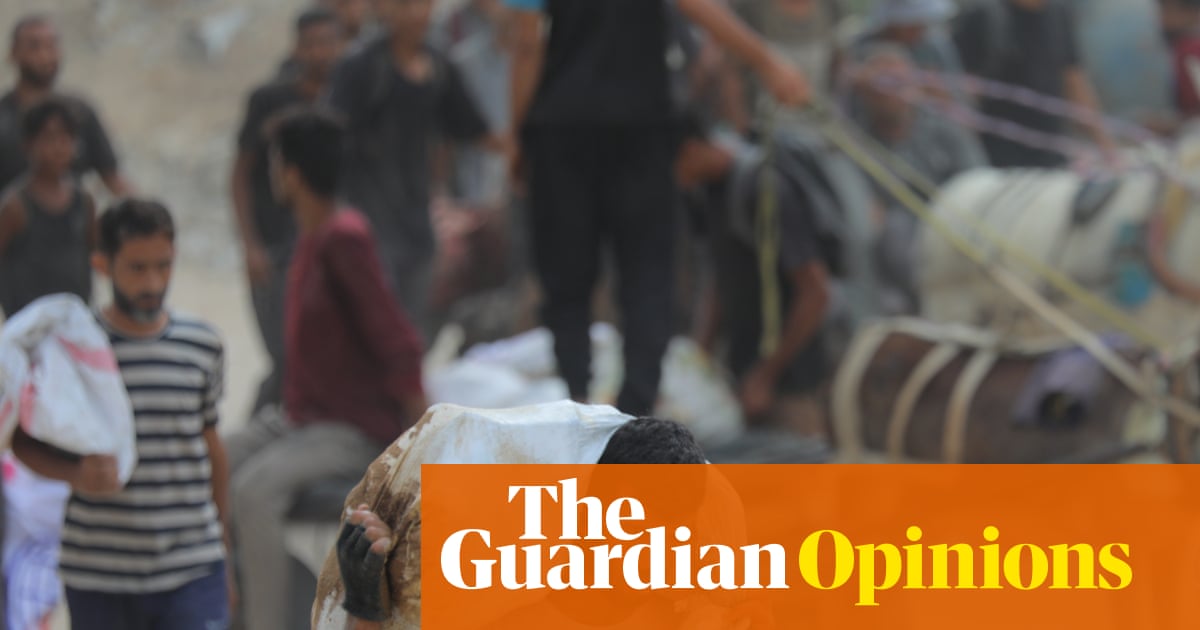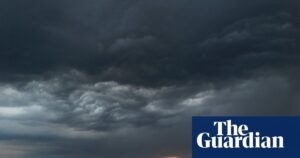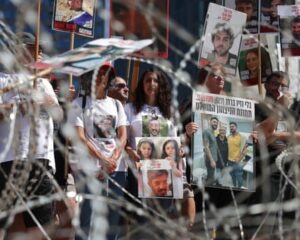
Gaza has been held under water for 22 months, allowed to gasp for air only when Israeli authorities have succumbed to political pressure from those with more leverage than international law itself. After months of relentless bombardment, forced displacement and deprivation, the impact of Israel’s collective punishment of Gaza’s people has never been more devastating.
I have been part of coordinating humanitarian efforts in Gaza since October 2023. Whatever lifesaving aid has entered since then has been the exception, not the rule. More than a year after the international court of justice (ICJ) ordered Israel to “take all measures within its power” to prevent acts of genocide – and despite all our warnings – we are still witnessing starvation, insufficient access to water, a sanitation crisis and a crumbling health system against a backdrop of ongoing violence that is resulting in scores of Palestinians being killed daily, including children.
Powerless to change this, we humanitarians have resorted to using our voices – alongside those of Palestinian journalists who risk everything – to describe the appalling, inhuman conditions in Gaza. Speaking out, as I’m doing now, in the face of deliberate, preventable suffering is part of our role to promote respect for international law.
But doing so comes at a price. After I held a press briefing in Gaza on 22 June in which I described how starving civilians were being shot while trying to reach food – what I called “conditions created to kill” – the Israeli minister of foreign affairs announced in a post on X that my visa would not been renewed. The Israeli permanent representative to the UN followed up at the security council announcing that I would be expected to leave by 29 July.
This silencing is part of a broader pattern. International NGOs face increasingly restrictive registration requirements, including clauses that prohibit certain criticism of Israel. Palestinian NGOs that, against the odds, continue to save lives daily are cut off from the resources they need to operate. UN agencies are increasingly being issued only six, three or one-month visas based on whether they are considered “good, bad or ugly”. The United Nations Relief and Works Agency for Palestine Refugees in the Near East (Unwra) has been targeted through legislation, its international staff barred from entry and its operations slowly suffocated.
These reprisals cannot erase the reality we’ve witnessed – day in, day out – not just in Gaza but in the West Bank too. What I have observed there looks different from what is unfolding in Gaza, but there is a unified purpose: severing territorial continuity and forcing Palestinians into ever-shrinking enclaves. Palestinians in the West Bank are daily being coerced and contained: coerced by settler violence and demolitions out of areas where settlements are expanding and contained by a network of movement restrictions into disconnected built-up areas where there are increasing military operations.
Gaza is also being fragmented. Its 2.1 million people are now being crammed into just 12% of the land area of the Strip. I remember receiving the chilling call on 13 October 2023 announcing the forced displacement of the entirety of northern Gaza. Since that brutal opening act, almost all of Gaza has been forcibly displaced – not once but repeatedly – without sufficient shelter, food or safety. I have seen first-hand what appears to be the systematic dismantling of the means to sustain Palestinian life. As part of our role to coordinate humanitarian operations, my colleagues and I have helped carry patients out of dark, cat-infested ICU wards in destroyed hospitals overtaken by Israeli forces where the dead were being buried in the courtyard by the last remaining sleep-deprived staff who had witnessed their colleagues being marched away.
We helped uncover mass graves in other hospital courtyards where families searched through scattered clothes trying to identify loved ones who had been stripped before being killed or disappeared. We have argued with soldiers who were trying to forcibly remove a screaming spinal cord injury patient from an ambulance while being evacuated from a hospital. We have repatriated the bodies of humanitarian workers killed by drone strikes and tank fire while trying to deliver aid, and collected the bodies of family members of NGO workers who were killed in sites acknowledged by Israeli forces as “humanitarian” locations.
We have seen medics in their uniforms killed and buried under ambulances crushed by Israeli forces. Overcrowded shelters for displaced people bombed, with parents clutching their injured or dead children. Countless bodies in the streets being eaten by dogs. People calling from beneath rubble, with help from first responders denied until no one was left breathing. Children wasting away from malnutrition while aid navigates an insurmountable obstacle course of obstructionism.
Israeli authorities accuse us of being the problem. They say we are failing to collect goods from the crossings. We aren’t failing, we are being obstructed. Just last week I was on a convoy headed to Kerem Shalom crossing from inside Gaza. We escorted empty trucks through a densely crowded area, an unnecessarily complicated route provided by Israeli forces. When the trucks were lined up at a holding point and the green light to move to the crossing finally came from Israeli forces, thousands of desperate people moved with us, hoping the trucks would return with food. As we crawled forward, people clung to the vehicles until we saw the first dead body on the side of the road, shot in the back from the direction of Israeli forces. At the crossing, the gate was shut. We waited around two hours for a soldier to open it.
That convoy took 15 hours to complete. With other convoys, Israeli forces have delayed returning trucks while crowds gather and killed desperate people who were waiting for the trucks to arrive. Some of our goods have been looted by armed gangs operating under the watch of Israeli forces. During the ceasefire, we ran multiple convoys a day. Now chaos, killing and obstruction are again the norm. Aid is vital, but it will never be a cure for engineered scarcity.
The ICJ has been clear. In its binding provisional measures, it not only ordered Israel to prevent acts prohibited under the genocide convention, it also ordered Israel to enable urgently needed basic services and humanitarian assistance, including by increasing aid crossings. In a separate advisory opinion, the ICJ left no room for doubt: Israel’s ongoing occupation of Gaza and the West Bank, including East Jerusalem, is unlawful under international law. Gaza and the West Bank, including East Jerusalem, are different parts of the same picture.
What is unfolding is not complicated. It is not inevitable. It is the result of deliberate political choices by those who create these conditions and those who enable them. The end of the occupation is long overdue. The credibility of the multilateral system is being weakened by double standards and impunity. International law cannot be a tool of convenience for some if it is to be a viable tool of protection for all.
Gaza is already drowning beneath bombs, starvation and the relentless grip of the blockade on essentials for survival. Every delay in enforcing the most basic rules meant to protect human life is another hand pressing Gaza down as it struggles for breath.
Do you have an opinion on the issues raised in this article? If you would like to submit a response of up to 300 words by email to be considered for publication in our letters section, please click here.








